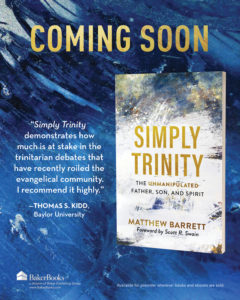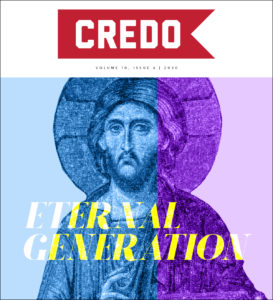Eternal life involves knowing the right God in the right way. This boils down to knowing the true God and his Son Jesus Christ, who is the only mediator between God and man (Jn. 17:3; 1 Tim. 2:5). Eternal generation teaches us who the mediator is as the eternal Son of God. Taking on human flesh, Christ’s humanity was the humanity of God the Son. His deity meant that he was worthy to offer himself to God for us to remove the guilt and consequences of our sin. It was necessary for him to be man, however, so that he could represent us as a new and better Adam. As Thomas Manton (1620-1677) explained, God cannot die, but he who was God died for us.[1] Eternal generation tells us something about who Christ is as God in relation to his Father. We need to understand who he is in himself in order to understand why he works the way he does for us. Ultimately, God does what he does, because he is who he is.
John Owen’s (1616-1683) treatment of the eternal generation of the Son is relatively unremarkable, yet it is clear. It is unremarkable because it was standard Christian theology. Yet Owen can help us understand clearly what eternal generation means and why it is important. I will show below that Owen taught that eternal generation meant that the Son is God equal with the Father by eternal communication of the divine essence from Father to Son. After outlining Owen’s teaching briefly, I will conclude by evaluating the importance of eternal generation for understanding who God is and why he works the way that he does. John Owen’s treatment of the eternal generation of the Son is relatively unremarkable, yet it is clear. It is unremarkable because it was standard Christian theology. Share on X
Owen on Eternal Generation
Owen explained eternal generation in terms of an eternal order among the Father, the Son, and the Holy Spirit.[3] I will summarize his treatment of the topic to three points, taking from various parts of his writings, can help show what eternal generation means.
The first point of importance is Owen’s assertion that there is no such thing as an eternal Father without an eternal Son. He wrote, “Whoever denies Christ the Son, as the Son, that is, the eternal Son of God, he loses the Father also, and the true God; he hath not God. For that God which is not the Father, and which ever was, and was not the Father, is not the true God.”[4] Targeting the Socinians, who were the Unitarians of his day, the point is that if we deny that the Son is co-equal with the Father from all eternity, then we lose the deity and personhood of the Father along with the Son. An eternal Father presupposes an eternal Son. Eternal generation means that there was never a time when the Son was not God equal with the Father, without subordination. Yet full equality with the Father does not erase the eternal order of subsistence in the Trinity. The Son is of the Father by eternal generation, while the Spirit is of the Father and the Son by eternal procession. The assertion here is that he who denies the Son does not have the Father either (1 Jn. 2:23).
The second major issue is that the Son is of the Father from all eternity. Owen used widely accepted language of the Father as the fount or origin of the Trinity, or of the deity.[5] Eternal generation described the sense in which the Son was God equal with the Father. Owen explained this by stating that the Son was God of the Father because the Father communicated to him “the whole entire divine nature.”[6] This meant that eternal generation referred to an eternal communication of the whole divine essence from the Father to the Son. Eternal generation constitutes the personhood of the Son, because, while the divine persons are distinct in their order and personal relations to one another, personhood and essence cannot be divided in the Trinity. We need a whole Trinity to save us wholly, and we need to come to God respecting the eternal order of the divine persons. Share on X
The person begotten is a divine person. The Son is God as begotten of the Father, and the Spirit is God as proceeding from Father and Son.[7] This is why the generic term, “God,” in the New Testament refers primarily to the Father as representing the majesty of the entire Trinity. Others, such as John Calvin (1509-1564), argued that eternal generation meant that the personhood of the Son was of the Father, but that his deity was not, which resulted in long-lasting controversy.[8] Yet Owen’s view was the majority position in Western Trinitarian thought, and most Reformed authors taught the same thing.[9] While divine attributes cannot be communicated or conveyed to creatures (not even to Christ’s human nature), the Father communicates the whole divine nature to the Son in eternal generation. The Father has life in himself as the eternal God, and he has granted the Son to have life in himself as the eternal second person in the Trinity, equal with the Father in divine glory (Jn. 5:26).[10]
The third issue is that God’s works reflect God’s Triunity. Again, God does what he does because he is who he is. While divine worship respects “each person of the blessed Trinity equally, not as this or that person, but as this or that person is God,”[11] God’s works, and our fellowship with God, reflect the eternal order of the divine persons. The Father is God of none, the Son is God of the Father, and the Spirit is God of the Father and Son together.[12] 
Flowing from these eternal relations, everything God does originates with the Father, is effected by the Son, and is perfected or completed by the Spirit. God created the world through the Son as his eternal Word, and by his Spirit hovering over the face of the deep. The Father sent the Son to become man, the Son became incarnate, and the Spirit united the divine and human natures by overshadowing Mary’s womb. The Father planned salvation in love, the Son purchased salvation in grace, and the Spirit applies salvation as the bond of communion between God and redeemed humanity.[13] As God saves us from the Father, through the Son, by the Spirit, so we return to God by the Spirit, through the Son, to the Father.[14] Eternal generation comes into this picture because it means that the Father reveals himself, works, and saves sinners through his Son, and that we cannot come to know him apart from the Son. Including the Spirit’s work, we need a whole Trinity to save us wholly, and we need to come to God respecting the eternal order of the divine persons.
Why Owen’s Treatment of Eternal Generation is Important
Eternal generation is a vital part of the church’s reflection on who God reveals himself to be in the Scriptures, and nothing is more important than knowing who God is. Share on X Owen shows that eternal generation is vital, both for the doctrine of the Trinity, and for knowing the right God in the right way. If importance means groundbreaking ideas that shatter common conceptions, then Owen on eternal generation is relatively mundane. Eternal generation as eternal communication of deity from Father to Son was common to Lutherans, Reformed theologians, and Roman Catholics alike. All parties also affirmed that the Son was equal to the Father in divine glory without subordination. They all taught an eternal order among the persons of the Trinity as well, the Father always being the first person, the Son second, and the Spirit third in eternal intra-Trinitarian being and communion. However, if Owen’s teaching was commonplace, then it is often under-appreciated today.[15] Eternal generation is a vital part of the church’s reflection on who God reveals himself to be in the Scriptures, and nothing is more important than knowing who God is.
Owen’s teaching on eternal generation has practical implications as well. Too often today the gospel has become a list of benefits rather than the work of three divine persons. Do we reduce the gospel to the forgiveness of sins and changed lives, or do we understand that the gospel aims to restore the true knowledge and worship of God? Put bluntly, is the gospel about us and what we get out of it, or is it about God and what he does to restore our relationship with him? Eternal generation becomes relevant to us, and so does the Trinity for that matter, if the goal of salvation is coming to the Father, through his Son, and by his Spirit.[16]
For those interested in expanding Owen’s treatment of eternal generation and the gospel, I recommend reading Communion with God or Pneumatologia. My hope is that this has whet the appetites of readers to dig deeper into eternal generation.
Endnotes
[1] See Westminster Larger Catechism questions 38-40 for more detail on why Christ had to be both God and man in one person. This is adapted from Thomas Manton, The Complete Works (London: Nisbet, 1870), 10:114.
[3] This material is summarized from Ryan M. McGraw, “A Heavenly Directory:” Trinitarian Piety, Public Worship, and a Reassessment of John Owen’s Theology, Reformed Historical Theology (Göttingen: Vandenhoeck & Ruprecht, 2014), 52–57.
[4] John Owen, The Works of John Owen, A Brief Declaration and Vindication of the Trinity and the Atonement of Christ, ed. W. H Goold (London: Banner of Truth Trust, 1965), 2:382.
[5] Owen, Works, Pneumatologia, 43, 60, 94, as examples.
[6] Owen, Works, Pneumatologia, 197.
[7] For Owen’s defense of the procession of the Spirit from Father and Son and not from the Father alone, otherwise known as the filioque, see Owen, Works, Pneumatologia, 184-188, 191, 478.
[8] John Calvin, Institutes of the Christian Religion, ed. John T. McNeill, trans. Ford Lewis Battles, vol. XX–XXI, Library of Christian Classics (Philadelphia: Westminster Press, 1960), 153. Book 1, chapter 3, section 25.For more detail on this thorny controversy, see Brannon Ellis, Calvin, Classical Trinitarianism, and the Aseity of the Son (Oxford: Oxford University Press, 2012).
[9] Mark Jones, Why Heaven Kissed Earth: The Christology of the Puritan Reformed Orthodox Theologian, Thomas Goodwin (1600-1680), vol. 13, Reformed Historical Theology (Göttingen: Vandenhoeck & Ruprecht, 2010), 116.
[10] Owen’s contemporary, Edward Leigh explained: “The personal property of the Father is to beget, that is, not to multiply his substance by production, but to communicate his substance to the Sonne. The Sonne is said to be begotten, that is, to have his whole substance from the Father by communication.” Edward Leigh, A Systeme or Body of Divinity Consisting of Ten Books, Wherein the Fundamentals and Main Grounds of Religion Are Opened (London, 1654), 206.
[11] Owen, Works, “The Nature and Beauty of Public Worship,” 9:58.
[12] See Westminster Larger Catechism question 10.
[13] Love, grace, and communion are the three terms Owen chose to characterize our fellowship with God in his book on communion with the Triune God in volume 2 of his Works.
[14] This is the pattern Owen set in his two sermons on “The Nature and Beauty of Public Worship,” cited above from volume 9 of his Works, based on the Trinitarian order of Eph. 2:18.
[15] For an excellent work defending eternal generation and its importance from various perspectives, see Fred Sanders and Scott R. Swain, eds., Retrieving Eternal Generation (Grand Rapids, MI: Zondervan, 2017).
[16] For a practical treatment of how the Trinity affects every area of Christian faith and practice, see Ryan M. McGraw, Knowing the Trinity: Practical Thoughts for Daily Life (Alliance of Confessing Evangelicals, 2017).


